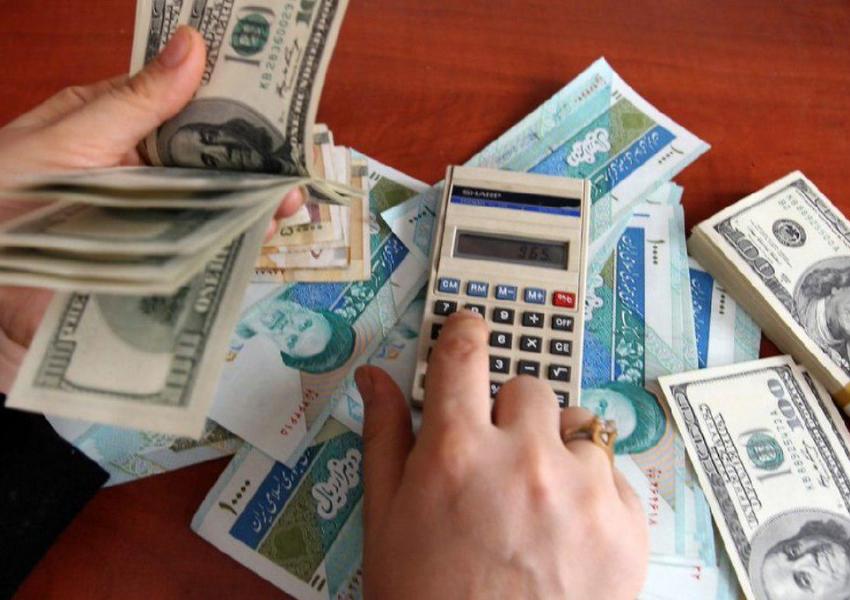
Iran's Currency Rises And Falls With News About Nuclear Talks, Blocked Funds
The conservative news website Alef in Iran has estimated Iran's blocked funds abroad to be more than $15 billion. According to Alef, any news about the possibility of releasing these assets goes a long way to boost Iran’s currency, battered by three years of US economic sanctions.
Developments perceived negatively in Iran such as the US air strike on Iran's proxy groups in Syria and the Biden Administration's policy not to lift US sanctions before negotiations with Tehran, lead to a rise the value of the US dollar in the local market. Just on Saturday, which was the beginning of the week in Iran, these developments boosted the dollar.
Later in the day as news emerged of the possible release of Iran’s blocked funds by South Korea and Iraq the rial rose slightly. Often it becomes a dizzying experience to follow the rials rise and fall.
Just before the 1979 revolution, 70 rials bought one US dollar. After 42 years one needs to exchange 250,000 rials for the same old US dollar. That is a 3,500-fold drop, while Iran still holds one of the largest oil and natural gas reserves in the world.
The problem however is that the country’s 'revolutionary' foreign policy, often confronting the United States and Europe, has prevented its economy from attracting substantial foreign investments. Years of international and US sanctions, restricting the country’s banking relations and oil exports have also weakened the national currency.
But lately, with the country in desperate need of foreign currency infusions, exchange rates have come to depend on news about Iran's frozen assets. Traders believe that the release of Iran's frozen assets and any bright prospect for dialogue between Iran and the United States will strengthen the rial.
After the US withdrawal from the nuclear deal known as JCPOA in May 2018, Iran's oil export money was frozen in some foreign banks, including South Korea where two of the country’s banks hold $7 billion of Iranian government’s funds.
With the new US President expressing a desire to negotiate over reviving the JCPOA, Iran expects that its assets in Korea will be released at one point. Central bank Governor Abdolnasser Hemmati held a meeting with Korea's ambassador in Tehran last week and discussed how Iran would be able to transfer or spend parts of its money in South Korea.
Korean officials said after the meeting that Iran's assets will be released after consultations with the United States.
Hemmati estimated Iran's frozen assets in Korea at $7 billion in a meeting with reporters saying that the release of Iran's assets in Korea will start with a first instalment of one billion dollar.
Hemmati added that Korea has approved the payment and Iranian officials have instructed them that Tehran wishes to use some of the funds to purchase one billion dollars' worth of raw material for medicine and industrial parts from Korea.
Meanwhile, a South Korean official said last week that the United States has agreed that part of the Iranian assets in Korea may be transferred through international banks. This includes $16.25 to cover Iran's membership fee for the UN.
Reports say that that the Swiss Channel for Humanitarian Trade Agreement that was established in 2020 will be used for such transfers. Swiss banks will guarantee Iran's payments for medicine and other items.
Likewise, Iraq's payments to Iran for buying electricity and natural gas was also kept at an Iraqi bank. A new round of diplomacy seems to have started between Iran and Iraq to facilitate the repayment of Iraq's debt to Iran which is estimated at $5 billions.
In the meantime, Japan's ambassador to Tehran informed Hemmati that Tokyo has been trying to facilitate Iran's access to its frozen assets for buying medical equipment. Reports say Iran's frozen assets in Japan amount to $3 billions.
However, the chairman of Iran and Japan's Joint Trade Committee Bahram Shakouri says because of the sanctions, Iran's assets in Japan cannot even be used for barter trade and Tokyo cannot even provide machinery and equipment in lieu of cash.








